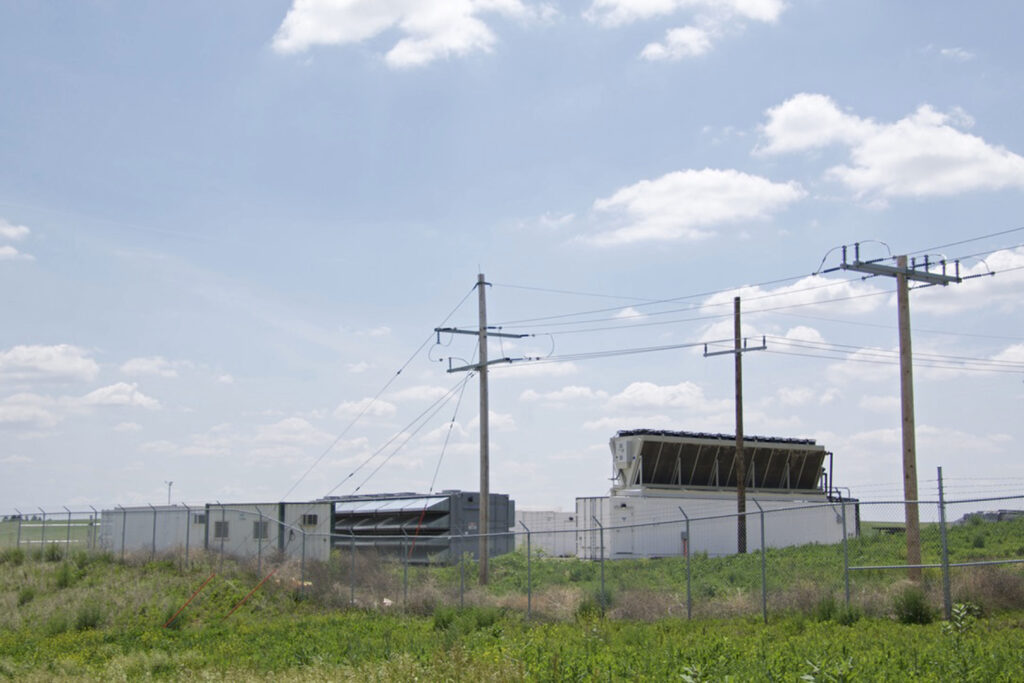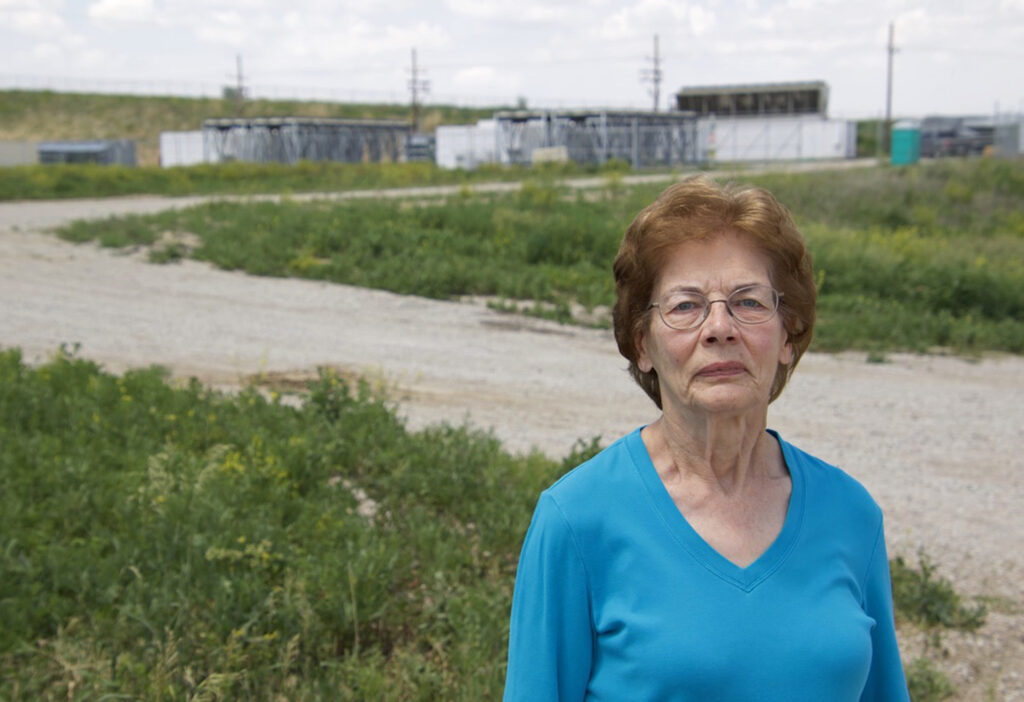Justin Kennedy had long envisioned more than a cornfield when he gazed at the plot of family land a half-mile from where he grew up.
It was “the perfect setup” for building his dream retirement house in rural Stanton County.
He planted a shelterbelt across the dirt road nearly two decades ago and hoped the trees would one day block prairie gusts from reaching his porch.
Then the Nebraska Public Power District announced its intention to run a high-voltage transmission line through the view from his dream doorstep. The Kennedys objected. The utility responded by filing a petition to use eminent domain on six acres of the land.
“It feels like a once-in-a-lifetime opportunity is being taken away from me,” Kennedy said.
NPPD, which says it uses eminent domain only as a last resort to complete essential projects, recently used the tactic to condemn slivers of land owned by the Kennedys and three other families along the planned transmission line route it’s pairing with electrical substation upgrades.
The $20 million project, mostly paid for by Nebraska ratepayers, will feed one giant customer’s growing appetite for electricity: a bitcoin mining company called Jigowatt.
Jigowatt already demands by far the most electricity of any customer in the county. But the company’s long-standing request for additional power would allow it to triple the amount of energy it can use.
NPPD leaders argue the project is important because the new 7.5-mile line will make local power more reliable to all local customers — not just Jigowatt — and more resilient to bad weather. The utility treats landowners fairly, said NPPD General Counsel John McClure. More than two-thirds of landowners voluntarily signed easements for this project, allowing them to keep ownership of their property while NPPD runs the line through it.
The crypto miner’s energy usage during seasons and times when others aren’t consuming electricity will smooth demand and actually reduce costs for all ratepayers, McClure said.

“I don’t think there’s any doubt that Jigowatt’s load is contributing to (demand) growth up there, but everybody benefits from this transmission facility,” McClure said.
But some landowners decried NPPD’s approach to land acquisition as predatory and questioned their use of eminent domain for the project.
“If it’s for one private company, I think eminent domain should be absolutely off the table,” Kennedy said.
Jigowatt CEO Michael Westhoff said his company had nothing to do with routing or land acquisition for the transmission line. As a landowner, he said he sympathizes with some of Jigowatt’s neighbors’ complaints.
“I 100% understand where they’re coming from and do not like eminent domain either,” Westhoff said. “But the flip side of that is how would we ever build anything anywhere? There would be no railroads, there would be no highways, there would be no utilities, there would be nothing.”
NPPD’s use of eminent domain in Stanton County came soon after a Flatwater Free Press investigation found that the utility bought land in rural Lancaster County from two of its own executives, Ronald and Donna Starzec, for $25,000 an acre, more than twice the land’s appraised value.
Stanton County landowners said it’s a double standard that they’re now being forced to sell easements on their land for much less than the Starzecs got.
“We should be getting the same per acre for our loss as what they received,” said landowner Brett Leuthold.
NPPD’s purchase from the Starzecs was justified because of the land’s prime location, McClure said.
“Different locations, different uses, different values,” he said.
Potential energy

The poster boards presented by two visiting businesswomen promised a splashy community investment rarely made in Stanton County: an attractive modern building, 20-25 local jobs, millions of dollars in revenue for the local utility.
Northern Data wanted a huge amount of electricity — 70 megawatts — routed to its cloud-computing hub. The utilities were open to accommodating the request.
The Kennedy family liked the idea enough that in 2021 it sold the German firm 40 acres of farmland to build its flagship American facility.
“Little did we know what it would turn into,” Justin Kennedy said.
Six months after buying the land, Northern Data paused the project. Nine months after that, the company sold the plot without so much as breaking ground on the planned data center.
The property’s new owners had a different kind of computer-based business in mind: crypto mining.
In 2023, Lincoln-based Jigowatt began installing customized cargo containers housing computers and high-powered fans to cool them.
What is crypto mining?
Bitcoin and other crypto currencies are built upon a digital ledger called a blockchain, which records account information and transactions across a network of computers. Verifying those transactions requires computers to solve complex math problems.
The computers, known as crypto miners, are rewarded for solving these problems with digital coins, such at Bitcoin. After China banned crypto mining in 2021, many operations flocked to rural areas of the U.S. where land and energy are cheap, experts say.
In the early 2010s, bitcoin could be mined on regular home computers, but it now requires massive computing power. The U.S. Energy Information Administration estimated last year that crypto mining may account for as much as 2.3% of all American electricity consumption.
Stanton County Public Power District, which sells NPPD-generated power to local customers, created a new “interruptible” electric rate for Jigowatt’s operation that would charge the company a lower per-unit cost than residents and other businesses.
The local utility also sold Jigowatt four acres next to a substation in Norfolk to host more crypto mining pods.
Stanton County Power officials didn’t go looking for Jigowatt, said SCPPD Board President Doug Oertwich, but it was good fortune that the company approached the utility and eventually wanted to take on the electric load planned for Northern Data.
But the crypto miner didn’t build a nice facility or hire many locals, Justin Kennedy said. And the fans cooling the computers produced a mechanical noise that disturbed some neighbors.
“We felt deceived,” Kennedy said. “It just felt miserable because we thought we were doing something good for the people around there.”
As Jigowatt began to mine for crypto, SCPPD’s total electric load skyrocketed, nearly tripling from 2023 to this year.
Jigowatt’s current load in Stanton County is 20 megawatts, but the company, like Northern Data before it, has sought to bump that to 70 megawatts, said CEO Westhoff.
That much power requires a new transmission line running from a Norfolk substation to another substation across the road from Jigowatt, McClure said.
NPPD held open houses where Project Manager Paul Brune told locals the project was needed to meet increasing demand and enhance reliability and resiliency in Stanton, Cuming and Burt counties.
After announcing the transmission line’s route last year, NPPD right-of-way agents began speaking with residents, offering payment if they’d allow the new line to run through their properties.
Fifteen landowners took the offer. Five, including two separate Kennedy family trusts, refused.
The unwilling sellers, who collectively own a dozen acres along the route, each received a letter this spring with a final offer and a warning: NPPD will pursue eminent domain if you don’t accept within 10 days.
The letters were signed by Ron Starzec, NPPD’s land management chief who had sold his land to the utility for above-assessed value.
“That’s kind of ironic, isn’t it?” said Leuthold, one of the landowners who refused to sign.
Four families vs. NPPD

Tony and Mary Wortmann’s frustrations with the bitcoin mine started when a powerful low hum penetrated their farmhouse.
The 73-year-olds say the sound of the computer-cooling fans a half-mile away has caused them headaches, achy joints and psychological distress.
“I never complained about noise until Jigowatt came,” Tony Wortmann said. “It keeps us up at night. It wears on our brains.”
When NPPD approached the couple about using a fragment of their land for the transmission line that would supply more power to Jigowatt, it added insult to injury, they said.
The Wortmanns and other landowners said they grew frustrated with the utility’s agents.
“This whole process was supposed to be a negotiation, and there was no negotiation at all,” Leuthold said. “They came in, they offered a number, and that’s all it was.”
Every conversation with NPPD employees had “a sprinkle of threat” of eminent domain to compel landowners to sign the agreement, Kennedy said.
McClure said NPPD strives to treat landowners with respect and approaches them in good faith. Land prices are determined by a contracted appraiser, he added.
“We just have to respectfully disagree about the nature of the negotiations,” he said.

After NPPD filed to condemn the land belonging to the four holdout families, a county judge appointed three local real estate agents and bankers to serve as independent appraisers in each case.
One by one, the families appealed for higher valuations as they faced off with NPPD’s hired lawyer in informal hearings.
Ordinary landowners with no courtroom experience shouldn’t have to “defend ground that is already ours” against a seasoned attorney, said Leuthold, who now opposes eminent domain altogether.
“The little guy gets walked all over,” Leuthold said. “If you don’t educate yourself quickly, you’re taken advantage of.”
For three families, including the Leutholds and the Wortmanns, the appointed appraisers came back with figures that differed from NPPD’s original appraisals by less than $1,000 per acre. All three families have appealed the decision.
The Kennedys were last to go to court and came prepared with custom-made poster boards featuring their own calculations of land value. Their final appraisal would pay them about $13,000 per acre, nearly 35% more than NPPD offered but far less than what the family asked for.
Early legal interpretations of eminent domain meant it could be used only for projects that clearly serve the public. But government entities have increasingly tried to use eminent domain to bring in private companies, said Severin Borenstein, a University of California-Berkeley economics professor.
Even so, NPPD’s use of eminent domain is “pretty controversial” given that the transmission line seems to primarily serve the demands of one customer, Borenstein said.
It’s questionable whether public utilities should build infrastructure to accommodate crypto mining since the industry “doesn’t contribute that much to the economic good of the nation,” said Ed Hirs, an energy fellow at the University of Houston.
“Why are you going to take assets that everybody worked really hard to put in place for the good of everyone on the grid and add a parasitic load?” Hirs said.

NPPD has a duty to serve all customers, including crypto miners, McClure said. Jigowatt’s flexible load allows the local utility to interrupt the company’s service during busy periods, he noted.
For SCPPD, meeting Jigowatt’s demand grows the utility’s profits, which it can pass along to all of its customers by keeping rates low, said Oertwich, the board president.
Borenstein said a crypto miner’s flexible energy load could “fill in the demand” and support the grid financially, but some states have made mistakes that drove costs up, such as making big investments for businesses that don’t show up or buying energy back from miners during peaks.
Hirs is skeptical that crypto mining’s massive demand for power will do anything but drive up electricity prices, as he believes it has in his native Texas.
Westhoff, the Jigowatt CEO, said his company provides value by paying hefty taxes, including sales tax on the energy it buys.
The company and its tenants have a 2024 personal property tax bill of nearly $98,000, plus real estate taxes of about $18,000 for their Stanton County locations.
Jigowatt also pledged $100,000 toward a planned veterans memorial park in Stanton County.
Nebraska ratepayers will cover two-thirds of the transmission line’s $11 million price tag. The rest will be paid by ratepayers in a larger, 14-state region.
High-volume energy consumers in Nebraska including Jigowatt will pay for most of the $9.5 million in related substation enhancements.
Jigowatt won’t be directly charged for any of the infrastructure upgrades, but it has put up about $5 million in letters of credit that NPPD would keep if the company doesn’t end up using the energy it requested, according to Westhoff’s legislative testimony.
Nebraska lawmakers took an initial pass at regulating crypto mining this year when they passed a bill allowing utilities to interrupt the operations’ electric service and to demand payment or letters of credit before making infrastructure upgrades.
Starting this fall, utilities will be required to publish a list of crypto miners they serve and their energy consumption.
State Sen. Mike Jacobson, a North Platte Republican and longtime banker, said he’s concerned about “the taking of land when there’s not a clear public good.” Situations like the one in Stanton County have him thinking more broadly about eminent domain.
“If I own a piece of property and I don’t want to sell it, I don’t know why I should be forced to sell it at fair-market value,” Jacobson said. “I think I should be receiving a premium … and our eminent domain laws don’t really (allow) for that.”
Oertwich, SCPPD president, hopes Jigowatt is just the beginning of Stanton County’s power growth. Offering a reliable energy supply, he says, can attract more businesses and more jobs.
There’s talk of adding hog barns, chicken plants and other agribusinesses, said Oertwich, who also sits on the county board.
“It ain’t (that) we’re looking for data centers,” Oertwich said. “We’re looking for any kind of growth we can get.”
The Wortmanns see the immediate load growth in darker, more existential terms. Mary worries Jigowatt’s expansion will create more noise and make living in their home “totally unbearable.”
The sound has decreased since Jigowatt changed a few of its air-cooled systems to liquid immersion cooling, which is quieter, Westhoff said. Tenant miners operating on the site still use fans, but Westhoff said his company will build only immersion-cooled systems.
Mary Wortmann doesn’t buy that the crypto mine will grow quietly. She and her husband have talked about leaving the house they’ve lived in for three decades.
“They’re going to be driving us out of our home,” she said.



6 Comments
What a phenomenal story Jeremy; so frightening that things have gotten this far b efore all the general public is aware. The $25000 per acre here near Lincoln is an absolute gut punch – a reminder that those who are ‘in power’ can actually get transactions such as these completed before anyone knows. How can they live knowing the disturbing way it was accomplished “behind closed doors”? Damage to trust in public officials abounds.
Why don’t they run it along highway 275 and not through the fields
Wow, does this story sound familiar! Everything you talked about is happening right now in North Dakota. Rural Americans and their personal property rights are under assault.
If you’re taking land against the owners wishes. Your not treating them fairly!
I wait till they get it built and tear it down with my farming buddies it’s not like they couldn’t put it under ground this is bs to the 1000th
“NPPD, which says it uses eminent domain only as a last resort to complete essential projects, ”
Yeah, usually NPPD negotiates sweetheart deals with NPPD officers for the officer’s land (Starzecs)! A farmer in Stanton County? You’re screwed!
It’s time for NPPD to be reined in.